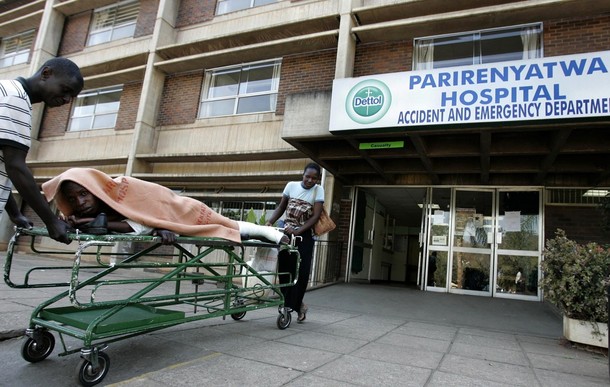


 ONE of Zimbabwe’s most reliable indicators of a recovering economy has been its health sector. Since 2009, bolstered by hope brought about by an inclusive government that lasted for less than five years, the country’s health sector had sort of rebounded, mainly through donor funding. But the continued rumblings in this key sector indicate that the southern African nation’s economy is still on a slippery slope.
ONE of Zimbabwe’s most reliable indicators of a recovering economy has been its health sector. Since 2009, bolstered by hope brought about by an inclusive government that lasted for less than five years, the country’s health sector had sort of rebounded, mainly through donor funding. But the continued rumblings in this key sector indicate that the southern African nation’s economy is still on a slippery slope.
The country’s nurses have threatened industrial action over unpaid bonuses. The threat comes just a few months after medical doctors nationwide went on strike demanding better wages. The doctors have also threatened to join the nurses after their salaries were slashed following their three-long job action of early November last year.
Despite the Finance and Economic Development Minister, Patrick Chinamasa, having assured the nurses that they will get their bonuses yesterday, the strike is almost inevitable given the state of government coffers that are virtually empty. That notwithstanding, the junior doctors’ grievances from last year are yet to be resolved.
After junior doctors failed to get a 400 percent salary hike and an upward review of their on-call and housing allowances, their salaries were cut over their “unsanctioned” strike and the aggrieved doctors have since passed a vote of no confidence in the Health Services Board alleging that it was grossly inefficient and incompetent. They were demanding that their employer reviews their salaries from the current US$282 to a minimum of US$1 200 per month, excluding allowances.
“In another thumbs down that is certain to put the last nail in the coffin of the beleaguered Health Services Board, the Apex Council on Health has unanimously voted for the dissolution of the board,” the Zimbabwe Hospital Doctors Association said in a statement.
Community Working Group on Health executive director, Itai Rusike, called for the resolution of the problems bedevilling the country’s health sector. “If the financing of health systems is solved, it will solve the problem of the health workforce. Access to a skilled health worker should be considered as an essential part of the right to health as well as required to guarantee basic health protection.
“The current Ebola outbreak in West Africa is a telling reminder that weak health systems capacity and the workforce deficit is one of the factors that contributed to the delayed containment of the Ebola outbreak and Zimbabwe had a similar experience with the Cholera crisis of 2008-2009 after a considerable proportion of our doctors and nurses had left the country to work in richer countries to earn an income with which they can sustain their families,” Rusike said.
He added that health workers needed incentives to address their social needs, such as transport, housing, children’s education, electricity, community support and access to health care. “Many health workers feel undervalued and frustrated working in under-resourced health services. For undervalued health workers, migration can also make economic sense. Pay differentials are certainly an important pull factor, with significant differences between source and destination countries.
“We thought the conditions of service for the health workers would improve when Zimbabwe in 2004 set the Health Services Board (HSB) to separate health worker employment from the direct control of the public service commission, unfortunately the HSB has not been given the flexibility to address the wider health worker issues such as real wage declines, salary increases, top-ups and allowances.
“The HSB needs to be given greater-decision making latitude for improving the conditions of service for the health workers.” However, debate on social media over the weekend questioned why civil servants should demand bonuses from a sector that makes no profit, considering many profit making companies were unable to give their workers the 13th cheque. The debate indicated that a broke employer (government) cannot pay bonuses and it emerged that it was unsustainable for government to continually give its employees bonuses in an underperforming economy.
It was therefore concluded by many that civil servants do not deserve the bonuses. Rusike recommended the need for Treasury to open up channels of communication between government and its employees. “Government should consult the health workers more because they do have a say on the issues that affect them directly. They should consult them before decision making so that they could know their opinions, feelings and views before making decisions that affect the health professionals.”
Since 2009, government has neglected its responsibilities with the public health sector receiving most of its funding from the donor community under the Health Transition Fund, a US$435 million multi-donor facility established in 2011 and set to expire in 2015. Also, the Ministry of Health and Child Care will be the principal recipient of US$98 million Global Fund resources earmarked for Tuberculosis and Malaria.
newsdesk@fingaz.co